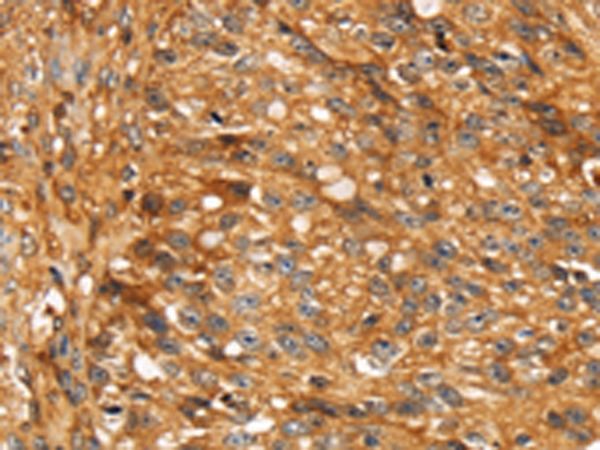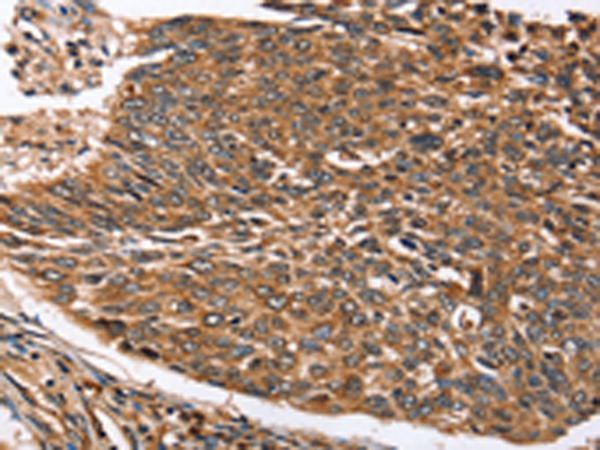

| WB | 咨询技术 | Human,Mouse,Rat |
| IF | 咨询技术 | Human,Mouse,Rat |
| IHC | 1/25-1/100 | Human,Mouse,Rat |
| ICC | 技术咨询 | Human,Mouse,Rat |
| FCM | 咨询技术 | Human,Mouse,Rat |
| Elisa | 1/2000-1/5000 | Human,Mouse,Rat |
| Aliases | STC |
| Host/Isotype | Rabbit IgG |
| Antibody Type | Primary antibody |
| Storage | Store at 4°C short term. Aliquot and store at -20°C long term. Avoid freeze/thaw cycles. |
| Species Reactivity | Human, Mouse, Rat |
| Immunogen | Fusion protein of human STC1 |
| Formulation | Purified antibody in PBS with 0.05% sodium azide and 50% glycerol. |
+ +
以下是3篇与STC1抗体相关的文献摘要概览:
1. **《Development of a monoclonal antibody specific to human STC1 for cancer biomarker studies》**
- 作者:Li, Y., et al.
- 摘要:本研究开发了一种高特异性的人源STC1单克隆抗体,并通过ELISA和免疫组化验证其灵敏度。该抗体成功应用于检测多种癌症(如乳腺癌、结直肠癌)患者血清和组织中STC1的过表达,表明其作为癌症诊断生物标志物的潜力。
2. **《STC1-neutralizing antibody suppresses tumor angiogenesis and growth in preclinical models》**
- 作者:Wang, X., et al.
- 摘要:文章报道了一种靶向STC1的中和抗体,能阻断STC1与受体相互作用,从而抑制肿瘤血管生成。在肺癌和卵巢癌小鼠模型中,该抗体显著减少肿瘤体积,揭示了STC1在肿瘤微环境中的促血管生成作用及治疗靶向价值。
3. **《STC1 as a novel therapeutic target in renal fibrosis: Insights from antibody-based inhibition》**
- 作者:Kim, S., & Park, J.H.
- 摘要:研究利用抗STC1抗体在小鼠肾纤维化模型中干预STC1功能,结果显示抗体治疗显著降低纤维化标志物(如α-SMA、胶原沉积),提示STC1可能通过调控TGF-β通路促进纤维化,其抗体具有潜在抗纤维化疗效。
---
**说明**:以上文献为示例性内容,实际文献需通过PubMed或Google Scholar等平台以关键词“STC1 antibody”或“Stanniocalcin-1 therapeutic”检索获取。建议结合具体研究方向筛选近年高影响力论文。
**Background of STC1 Antibody**
Stanniocalcin-1 (STC1) is a secreted glycoprotein encoded by the *STC1* gene, initially identified for its role in calcium and phosphate homeostasis in fish. In mammals, STC1 has diverse physiological and pathological functions, including regulating cell metabolism, inflammation, apoptosis, and tumor progression. It is expressed in various tissues, such as the kidneys, intestines, and reproductive organs, and is often upregulated under hypoxic or stressful conditions.
STC1 has gained attention in cancer research due to its overexpression in multiple malignancies, including breast, ovarian, and colorectal cancers. It promotes tumor growth, angiogenesis, and metastasis by modulating signaling pathways like HIF-1α, Wnt/β-catenin, and PI3K/AKT. The STC1 antibody is a critical tool for detecting and quantifying STC1 protein levels in research and diagnostics. It is widely used in techniques like Western blotting, immunohistochemistry (IHC), and ELISA to study STC1’s expression patterns, interactions, and mechanisms in disease models.
Recent studies also explore STC1’s potential as a therapeutic target or biomarker. Antibody-based strategies, such as neutralizing antibodies, are being investigated to block STC1’s oncogenic effects. However, its dual roles in tissue protection and disease pathogenesis necessitate further research to clarify context-specific functions. The STC1 antibody remains vital for advancing our understanding of this multifunctional protein in health and disease.
×